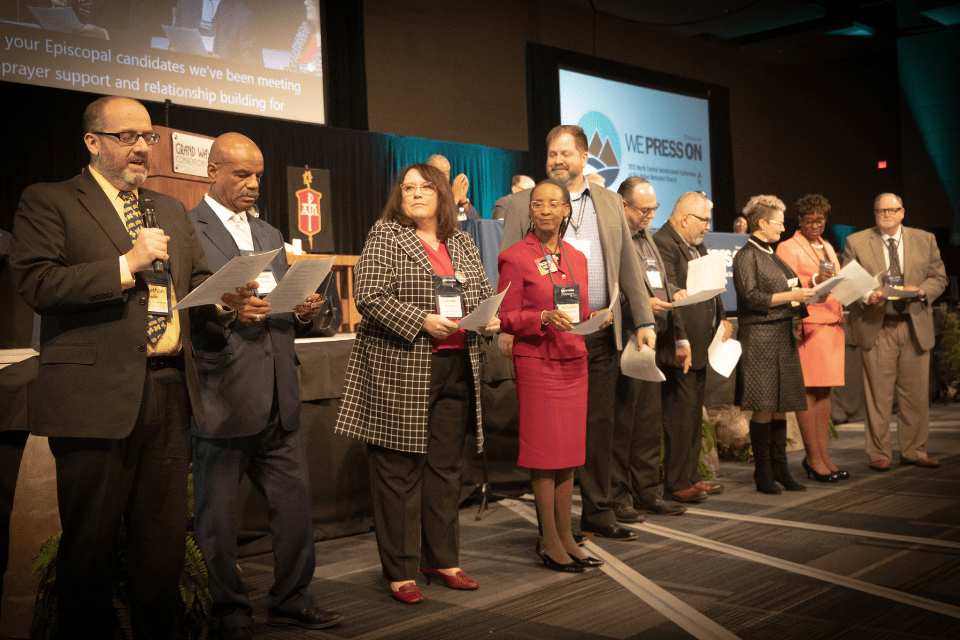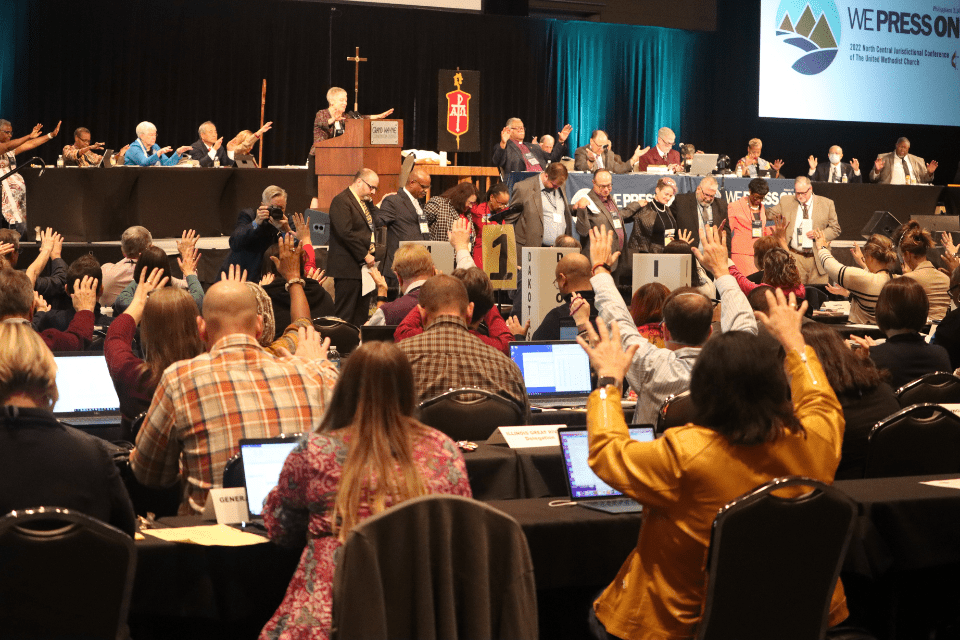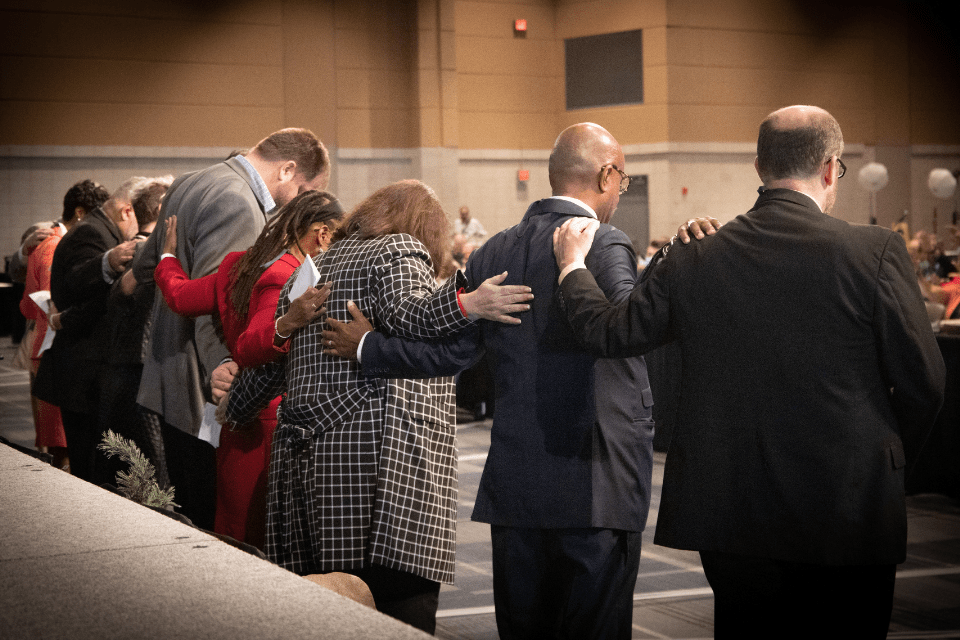The ten episcopal candidates for the North Central Jurisdiction formed a community that prayed and cared for each other, creating a message of unity and a model of mutual support that set the tone for the episcopal elections throughout the week.
REV. CINDY GREGORSON
Director of Connectional Ministries and Clergy Assistant to the Bishop, Minnesota Conference
The election of bishops at a jurisdictional conference has been called something akin to horse trading. It can feel more political than spiritual in nature. But the 2022 North Central Jurisdictional Conference felt noticeably different, thanks to the commitment and spirit of the ten episcopal candidates.
It all started, according to one of the candidates, Rev. Dr. Curtis Brown, about six weeks previously. Rev. Brown had seen a video created by the Western Jurisdiction administrative assistants on what it took to be a bishop. He sent that video out to all the candidates on an email chain. In the email, he told them that he was praying for each of them and said he’d be open to talking, meeting, or praying with one another. Bishop Lanette Plambeck emailed right back and said they ought to do this.
And so it began. All 10 of the episcopal candidates started to gather weekly on Friday mornings via Zoom with a simple agenda: “How is it going, what do you want to talk about, and how can we pray for you in this journey?” Brown reflected that it built community in a different way.

The candidates recognized that only two of the 10 had previous experience as a candidate for bishop, so they were able to help each other and share best practices.
“The goal was that we want every candidate to be here as their best self, displaying all the gifts that they have, fully as possible, to all of the delegates because that’s how the Spirit moves,” said Brown.
While the election of bishops is a competition for votes, the hope was that this could become less like pro wrestling and more like American Ninja Warrior, where all the competitors cheer ecstatically for one another the whole time. Relationship building and prayer were ways to do that.
Bishop Kennetha Bigham-Tsai echoed that sentiment. She noted that as a candidate for bishop in 2016, there was collegiality, but what was different this time was a result of the prayer, the emailing one another, and the one-on-one opportunities.
“It felt like greater camaraderie, greater unity; it felt like these are my colleagues as opposed to the other candidates for the episcopacy,” Bishop Bigham-Tsai noted. “I realized three people are going to get elected, so some of these colleagues are actually going to be on a college with me, or I might get assigned to an annual conference where this colleague might be the clergy assistant to the bishop or in some other role, and so for that reason, I really appreciated that it brought that whole sense of connectionalism and made it really, really real and gave me a personal sense of the importance of that. We will be working together. This is not the end of our relationship. It is important to honor and care for these relationships.”

Brown said the weirdest thing about this candidacy process is how lonely it is.
“Courageous leadership is vulnerable leadership,” he said. “You do that in isolation, and you are just lost. Where is the community for this? I think for me, we have been braver, we have been truer, we have been sustained and carried by the prayers of one another. There have been times in my life—and this is one of them—where it has literally been the prayers of the church that have been holding me up by my elbows.”
Where it went from a powerful, personal experience to a public witness was at the introduction of the candidates to the jurisdictional conference prior to the first ballot on Wednesday afternoon. They intentionally decided to offer a shared liturgy that proclaimed who they were, how they had been together, and their commitment to the integrity of the process. Each candidate concluded the statement, “I am [name], and I am praying for [name of another candidate].” The candidates invited all present to join them in the John Wesley Covenant Prayer of “I am not my own,” which set the tone for the elections.
Bigham-Tsai reflected that the North Central Jurisdiction, having passed the “Covenant for Building BeLoved Community” during the special session in November 2021, was turning a new page. “To be able to make that [group] statement before the body says we are going to go forward differently as the North Central Jurisdiction. We are going forward in community and in covenant with one another, in beloved community with one another. So, I think that models something to the whole body, and it brought a sense of unity to the body that was not there in 2016.”
Speaking about the impact of this way of engaging in the episcopal election process, Brown said, “I think it’s going to change the way the bishops work together. I think if we can continue this sort of pattern of openness, of deep collegiality from the beginning, and when the bishops walk into the college together, they are walking in already with the sense and a pattern of how it is we can work as a team, where we can come with our best selves and be vulnerable, caring and supportive, celebratory for one another from day one.”
So what about the horse-trading? When withdrawing candidates were asked about sending their delegates to another candidate, Brown said, “I was absolutely able to say, look, I fully trust, believe in, and support every one of the remaining candidates; I would love for them to be my bishop. . . . I want them to lead this church into a new age. And so that tone shift, I think, had a tremendous impact on how the delegates behaved with one another, because the candidates didn’t want that. They wanted to celebrate the giftedness of one another.” Bigham-Tsai said the election process this year was discernment—not political but spiritual discernment.
Every elected candidate mentioned how powerful it was to take this journey together. In his words to the jurisdictional conference upon his election, Bishop Dan Schwerin coined the group “The 22-10.” They now have a name and perhaps a legacy.
Brown concluded, “This is what Jesus does, right? You follow Jesus, you follow love. It subverts power. It subverts control; love builds community. I think it really is a witness to what we want the church to be.”
James Deaton, Content Editor of the Michigan Conference, contributed to this story.
Last Updated on November 15, 2022


